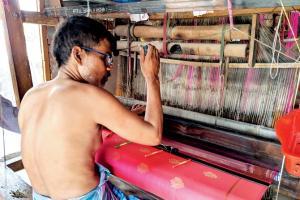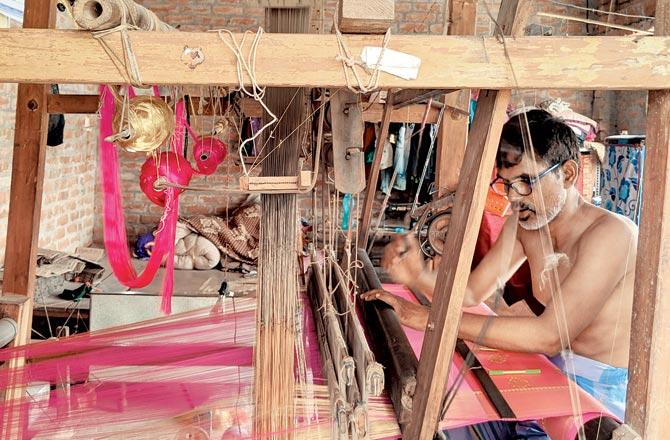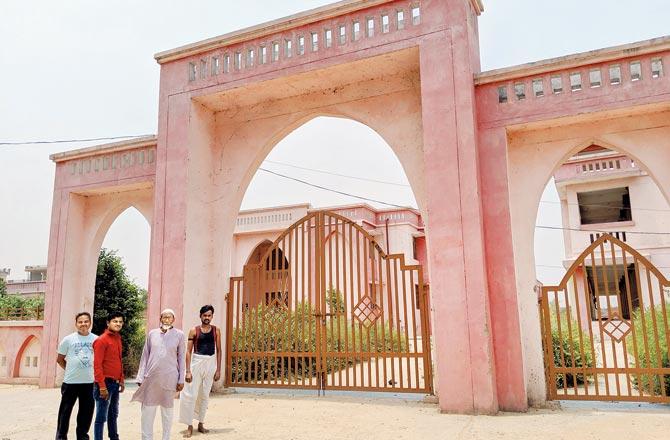In poll-bound Azamgarh, 15,000 weavers, who say their product is far superior to Benarasi silk, stare at uncertainty

Faizul Hassan at work on his handloom
Azamgarh: In a dingy but airy room in his house, Faizul Hassan, a weaver in Mubarakpur, works tirelessly on a handloom to make a silk saree that is sold as the brand Benarasi for a price that not many can afford. It may take a week's time to weave one full-length saree, but Faizul earns much less than the final price that his product commands.
In a dimly-lit, poorly-ventilated room downstairs, his 18-year-old daughter Iram runs a power loom, and then joins her younger sibling Haira, 14, to fine-tune the zardosi in a woven saree spread across the floor of a bada kamra that has cracks on its walls. Faizul's 10-member family includes his wife and eight kids — three sons and five daughters. He is the sole breadwinner who gets support from his wife and kids who share some burden.

Faizul Hassan, a weaver, earns much less than what his Benarasi sarees sell for
"Gujara hota hain kaise kaise (We make a living anyhow)," he says, adding that the bad business has made him tell the children to study hard and get good jobs. Iram is pursuing BA and Haira is in Std XII. The remaining children attend local schools. He says the kids who don't get jobs elsewhere will carry the family legacy of 400 years forward. Faizul says the condition of all 15,000 weavers, mostly the Muslims and Hindus, is similar. Other than weavers, block makers, dry-cleaners, labourers, transporters also depend on the main vocation of the town.
Can't weave around issues
Iftekhar Ahmed, secretary of Mubarakpur Reshmi Vastra Udyog Vyapari Mandal (a local co-operative of weavers) steps in to explain. "The difference between our product and the one which is made in Benaras (Varanasi) is that we make a pure silk product, whereas they (Benaras) mix a duplicate thread with pure silk. And yet, we're lagging behind because we don't have a market and brand name that can sell itself," he says.

Iftekar Ahmed and fellow weavers at the market constructed in Mubarakpur, which has not been inaugurated two years after completion. Pics/Dharmendra Jore
Ahmed himself is a weaver and doubles up as an activist for getting his place worldwide recognition by attending exhibitions across the country along with his two sons. Mubarakpur lost at least 10,000 weavers to the violence between two Muslim groups and a tense situation that prevailed after a bomb blast some years ago. "They had come from Bihar and some places in Uttar Pradesh, but migrated after the sad incidents. Efforts have been made by the Congress (UPA) and Samajwadi governments to improve the scene here," he said. Competition has made Mubarakpur innovate. The weavers came up with a jugad loom - they tweaked handlooms to turn them into power looms by fitting them with small motors. "This jugad helped us save physical labour in creating products that could be made on power looms. But handlooms remained because the work they create remains unmatched," said Ahmed.
Power brings with it problems
A big concern was raised when the Yogi government brought in electricity reform. A fixed monthly rate of R75 per power loom could be a thing of the past, because the electricity company has planned to install meters to compute power consumption. Ahmed and his president, Ammar Abidi, fear the worst in view of the new move. "Poor weavers here will not be able to pay huge power bills. The scheme given by Akhilesh Yadav (ex-CM and local Lok Sabha candidate) has been a boon of sorts. What will happen if it goes?" asks Abidi.
Another allegation that goes against the Yogi Government is that it did not make the Mubarkpur saree Azamgarh district's brand product under the scheme 'One District One Product'. Instead, the government chose 'black pottery', denying the weavers the benefit that the scheme would offer to bolster marketing.
The place which is very close to big cities from all sides does not have proper transportation and logistics facility. A demand made to the Congress's union government that rail connectivity to Gorakhpur and Varanasi be provided, remained unfulfilled. The lack of such facilities delays arrival of raw stock because the silk thread and other material required is not made in Mubarakpur. Here, the competition scores over Mubarakpur. The Samajwadi Party government conceded to a demand for constructing a market, but the complex is not inaugurated even after two years of completion. A beautifully built 158-shop place remains locked. A bus station was built but not many routes are planned, thus keeping the traders and tourists away.
Deliberate rejection by BJP?
"We have been petitioning Yogiji (UP CM Adityanath) frequently to start the facilities that are already built, but in vain," said Ahmed. The activist and his colleagues did not allege discrimination, but reactions from the people in the streets did smack of some deliberate rejection by the BJP, primarily because the constituency and this place in particular, is a stronghold of Samajwadi Party.
Catch up on all the latest Crime, National, International and Hatke news here. Also download the new mid-day Android and iOS apps to get latest updates
 Subscribe today by clicking the link and stay updated with the latest news!" Click here!
Subscribe today by clicking the link and stay updated with the latest news!" Click here!







